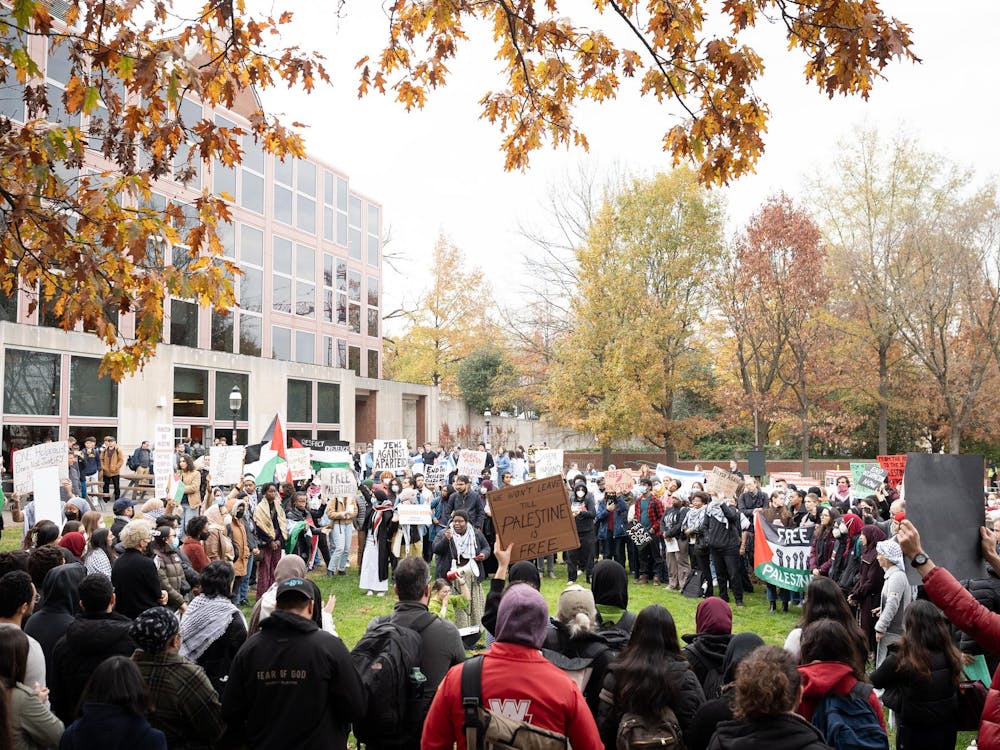President Eisgruber recently stated, “We at Princeton believe that it is a fundamental advantage for a university to be able to tolerate even offensive kinds of speech and to respond to bad arguments when they are made with more speech rather than with disciplinary actions.” His statement was made to defend freedom of expression, up to the point of protecting the right of student groups to commemorate Osama bin Laden, and this Board believes that such freedom extends to other offensive ideas and arguments.
This past weekend, a computer hacker known as “Weev” claimed responsibility for printing posters criticizing the presence of Jews in the United States and promoting white supremacy through the website of a group known as The Daily Stormer. This disturbing incident of anti-Semitism was conducted through illicit access to the University network by individuals outside the University community. The University has the right and the duty to discipline students involved in criminal trespassing; however, if the controversial and upsetting ideas themselves were promulgated by Princeton students, the students should not be censored or disciplined by the University administration. While this Board disagrees entirely and unequivocally with the abhorrent ideas promoted by the group, we reaffirm our commitment to free speech and call on the individual members of the campus community to challenge these and other offensive arguments through public discourse.
The University currently holds a rigorous conception of freedom of expression in Rights, Rules, and Responsibilities which already accounts for cases in which some restriction of expression should be present. According to section 1.1.3, “The University may restrict expression that violates the law, that falsely defames a specific individual, that constitutes a genuine threat or harassment, that unjustifiably invades substantial privacy or confidentiality interests, or that is otherwise directly incompatible with the functioning of the University.” The posters do not make personal threats against specific individuals, invade privacy, or interrupt University activities. The issue of a possible “hack” and illegal access should be investigated, yet while the posters make repulsive claims about a class of people, they do not threaten or harass specific persons. As vulgar as its ideas may be, The Daily Stormer presents arguments for its ideas, claims it opposes violence and asserts it will permanently ban anyone who promotes or suggests violence on its site.
Princeton’s campus is meant to be a place for open discussion of arguments and ideas. Censoring or disciplining students or groups with upsetting beliefs would harm rather than help the community. Students who seek to engage others in peaceful dialogue should be given the opportunity to do so. Some may argue that the poster’s use of the swastika and other inflammatory phrases can only be intended to intimidate and attack; however, it is unclear which University authority would make a final determination on the intent and value of controversial language and imagery. Determining the intent of a poster or of groups hosting controversial political figures, polemic artists or proposing divisive referenda is problematic, and any evaluative metric used by University authorities will likely be arbitrary. In the absence of clear threats to security or harassment, the University should not police the intentions behind intellectual and argumentative expressions.
This Board is firmly opposed to the tasteless ideas promoted by The Daily Stormer’s posters, but the ideas themselves should not be censored before the University community engages with and rejects them. We believe the arguments presented by The Daily Stormer are false and poorly argued, but it is our duty to respond critically. The dissent claims there is a place in the University community for academic discourse regarding the ideas promoted by the posters; consequently, it would have to defend policing the tone of advertisements for such events. We think this policing is wrong. We accept the necessity of being content-neutral in upholding the principle of free speech at Princeton, and we would apply the same standard to equally disturbing posters or content attacking any identity.
In general, the University should err on the side of freedom of expression, except when the expression constitutes a threat to security or clear harassment. We echo the University’s call for all its members “to display the appropriate sensitivity and to challenge expressions of racial or ethnic bias whenever they encounter them” (RRR 1.2.1); however, engaging with controversial ideas is the only way to preserve open discourse in our community.
Dissent:
The majority claims that the anti-Semitic posters distributed around campus, while tasteless, do not constitute grounds for disciplinary action since controversial and upsetting ideas should not be censored. However, this editorial ignores the uniquely harmful and hostile nature of these posters as hate speech. First, while the University should encourage academic discussion whenever possible, these posters are in no way a form of “artistic and intellectual expression.” For example, there is a huge difference between a lecture against gay marriage, which has an educational and respectful tone, and posters around campus that read “Homosexuals are degenerates.” The anti-Semitic flyers, by using slogans such as “White man, are you sick and tired of the Jews,” references to “degeneracy” and symbols such as the swastika, invoke hurtful imagery to incite and intimidate members of our community.
Furthermore, even if these posters are allowed in society at large, the University should uphold a higher standard of acceptable speech since it has a unique mandate to provide “an educational, working, and living environment free from discrimination and harassment based on a protected characteristic.” Due to this commitment to providing an environment free from harassment, the University should ensure that academic discussion and debate remains respectful. After all, conversation about neo-Nazism or race can occur without inflammatory and derogatory remarks that can create a hostile or alienating environment. Thus, by prohibiting these forms of expression and disciplining students caught promulgating hate speech, the University must strictly uphold its commitment to fostering respectful academic conversation.
Signed by Cydney Kim ’17
The Editorial Board is an independent body and decides its opinions separately from the regular staff and editors of The Daily Princetonian. The Board answers only to its Chair, the Opinion Editor and the Editor-in-Chief.









